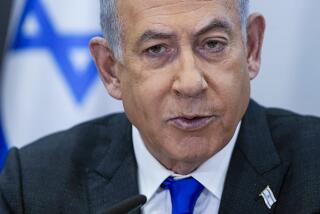Two-faced on terrorism
- Share via
WASHINGTON, Jerusalem and Brussels were shocked when the Turkish government recently invited the leader of Hamas, Khaled Meshaal, to Ankara. By hosting the leader of a terrorist organization -- one that has taken terror to new heights with its suicide bombings of malls and city buses -- Turkey undermined its own cause. After all, Turkey has for many years been campaigning to get its homegrown Kurdish insurgency classified as a terrorist group. The United States and European Union have done so. So the invitation to the Hamas leader was particularly strange coming from Turkey, even while Turkey is negotiating to join the EU.
The Turkish government justified its decision to invite Meshaal, who is based in Damascus, by arguing that Hamas had won free and fair elections in the Palestinian territories. The Turks stressed the importance of having a dialogue with Hamas in order to moderate its position.
Yet, at the same time, Turkey furiously tried to block meetings in Washington for one of its own citizens: the Kurdish mayor of the city of Diyarbakir. Osman Baydemir, a member of a pro-Kurdish but legal political party in Turkey, was in the United States last month for meetings, including some with the State Department and one with the Brookings Institution.
Through its embassy in Washington, the Turkish government demanded that Brookings rescind its speaking invitation to the mayor. When, to its credit, Brookings refused, the Turks retaliated by pulling out of a major Brookings event in Doha later in February that Turkish Prime Minister Recep Tayyip Erdogan was to open. The Turkish Embassy also pressured the U.S. government not to receive the Diyarbakir mayor at the State Department.
Unlike Brookings, the State Department gave in and sent a deputy assistant secretary to meet with him at his hotel, thereby providing the Turks the dubious satisfaction of claiming that no one in Washington would officially see the mayor.
Why this fuss about a democratically elected mayor carrying an official Turkish passport? The Turks mistrust Baydemir because they claim he has not sufficiently distanced himself from Kurdish rebels, and they are uncomfortable with the fact that Europeans are increasingly turning to him as an interlocutor on Turkey’s Kurdish problem.
Although Baydemir has never publicly advocated or sanctioned violence, Meshaal refuses to renounce the use of terror against Israeli civilians. The ultimate irony is that while Turks claimed to be encouraging dialogue with a known terrorist organization, they attempted to censor Americans trying to engage one of their own elected mayors.
With these heavy-handed tactics -- bullying the State Department and failing to alert its Western allies in advance that it intended to invite the Hamas leader for an official visit -- and its hypocritical position on terrorism, Turkey has weakened its position in the United States and infuriated the Europeans. Ankara also has alienated key constituencies in Congress that have long supported Turkish causes.
If the costs to its prestige and standing were this high, why did Ankara engage in such reckless behavior? The current Turkish leadership has been eager to show that it can be an international player and has long thought that Turkey punched below its weight. Moreover, most Turks, including Erdogan, have a great deal of sympathy for the Palestinian cause and so are more tolerant of Hamas than are Western publics.
In their zeal to emerge as a bona fide intermediary in the Palestinian-Israeli dispute -- and so to host Hamas before the Russians or the Iranians -- the Turks jumped the gun. They made a major faux pas in allowing Hamas to determine which of its leaders would be traveling to Ankara. Turkey could have waited to invite an elected Hamas member from the Palestinian territories. Meshaal rebuffed Ankara’s request to moderate Hamas’ refusal to recognize Israel. And from Ankara, he promptly went to Tehran, where he was feted by the hard-line Iranian regime.
Now, to the consternation of the Bush administration, the Turks have invited Muqtada Sadr, the firebrand anti-American Shiite cleric who has played a destructive role in Iraq, to visit.
Turkey has every right to chart an independent foreign policy, but if it wants to maintain the respect of its Western allies, it must steer a morally consistent course.
More to Read
Sign up for Essential California
The most important California stories and recommendations in your inbox every morning.
You may occasionally receive promotional content from the Los Angeles Times.













